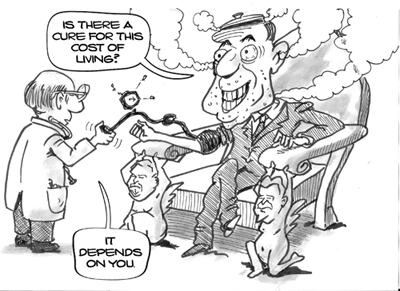 |
With the imminent introduction of the euro and peoples’ tendency to fear the unknown, the cost of living has become a matter for concern and a potential electoral issue. People keep asking themselves whether the euro will put up prices. With the opposition party presenting this issue as its main electoral platform, not unexpectedly, the discussion relating to the cost of living increases in significance.
A fair and objective assessment of this issue must take into consideration a number of factors. Our economy, an open economy, operates in a globalised world subject to free market conditions.
With its limited resources Malta imports most of its needs and is consequently subject to imported inflation and higher costs from overseas, resulting mainly from the increase in the price of oil and cereals. This factor has increased the costs of many imported items.
Yet government-induced costs in the form of the eco-tax, increase in the VAT rate and service charge hikes have all played a part in increasing the cost of living too. Many companies benefiting from a position of monopoly, or a dominant position in the marketplace, have also increased their charges for various services rendered. This particularly applies to the banks and insurance companies.
The conglomeration of all these factors has led to, not entirely justifiably, claims by the average person that life in Malta has become more expensive and consequently more difficult to make ends meet than in the previous years. Whether, and to what extent this is a matter of perception or reality is debatable, and warrants an objective analysis. Political parties too should offer their concrete suggestions and their political programmes should include provisions on how they intend to curb cost increases. To date, all have rightly ruled out the introduction of price orders. Which begs the question: if not through price controls, how is inflation to be controlled?
This newspaper believes in a social market economy where the free market is allowed to operate but constraints are imposed to ensure that companies in a dominant position, be they importers or service providers, do not abuse their position to the detriment of the consumer.
This effectively means that companies operating in the private sector who are not in a dominant position are free to determine their own price structures and as a result swim or drown according to the marketplace. Market forces will immediately indicate if the operator is on the right track. We do not feel however that companies operating within a position of dominance in the market place should have the same liberty. Firstly the market place in Malta is small with market forces rarely working perfectly. The possibility of cartels being formed amongst a limited number of operators, or worse still a company taking advantage of its position of monopoly in the market, warrants correction by the authorities. This constraint is equally applicable where the government is operating the service.
The tools and mechanism for the necessary control in the form of an office for fair-trading already exists, with all the necessary overseeing powers to ensure that abuses do not take place. We believe that this is the office which should be given, if necessary, increased powers to ensure that trade in Malta is conducted fairly and in full recognition of the power of the consumer. This offer should be sensitive to the consumer and his right to get a fair deal from business. Equally important is the beefing-up of genuine consumer organisations with the custodian responsibilities to ensure that consumers in Malta are given a fair deal. These organisations should be given the full support including financial resources by the government.
The long list of examples causing an increase in the cost of living produced by the GRTU makes interesting and possibly a shocking read too. Red tape and excessive bureaucracy, bank charges, excessive mobile charges, excessive parking contravention charges, increased insurances charges, eco-taxation, charges relating to implementation of European directives, the implementation of new part-time regulations, the excessive interest charges by government for delays in settling VAT dues, the increase in the vat rate, high charges by MEPA and so on. To be fair, not all the fiscal hurdles are unjustified. Nonetheless the list is endless and the resultant effect on perceptions and reality, makes it a force to be reckoned with.
We sincerely believe that many of the charges cited are a particular burden on the transaction of business in Malta today, and transmit into increased charges to the consumer with the resultant increase in the cost of living.
Any fair discussion on the cost of living involves recognition of imported inflation, the need to control cartels and monopolies and the encouragement of the ‘shop around’ culture. The power of the consumer is never to be underestimated.

